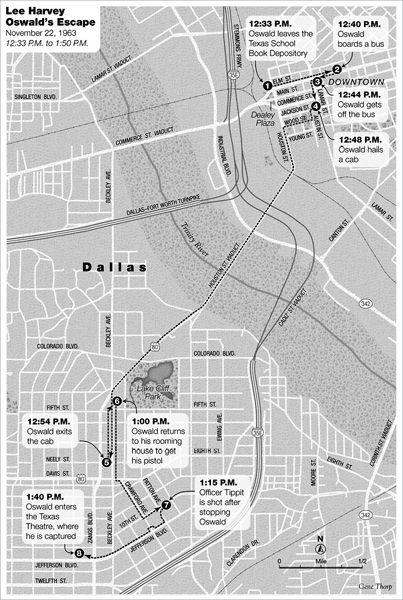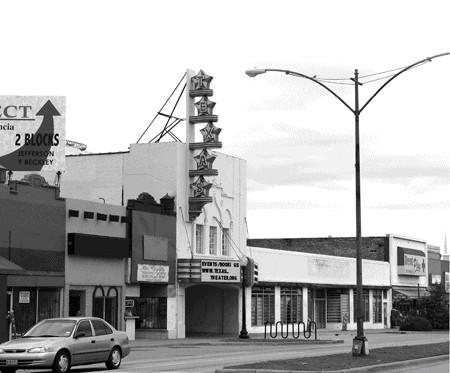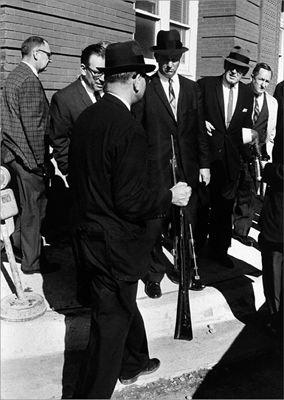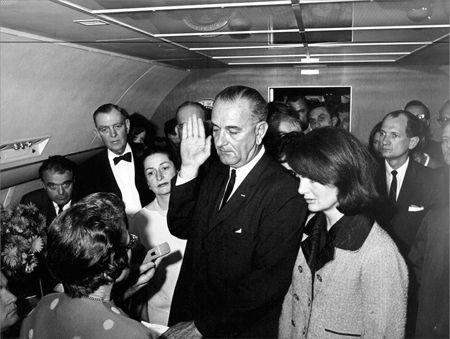Kennedy's Last Days: The Assassination That Defined a Generation (27 page)
Read Kennedy's Last Days: The Assassination That Defined a Generation Online
Authors: Bill O'Reilly
CBS newsman Walter Cronkite relays the news of Kennedy’s death to the nation: “From Dallas, Texas, the flash—apparently official—President Kennedy died at 1:00 p.m. Central Standard Time, 2:00 p.m. Eastern Standard Time, some 38 minutes ago.”
[© CBS Photo Archive/Getty]
CHAPTER THIRTY-EIGHT
NOVEMBER 22, 1963
Dallas, Texas 12:33
P.M.
to 1:50
P.M.
A
LOT HAPPENS TO
L
EE
H
ARVEY
O
SWALD
between 12:30
P.M.
and 1:00
P.M.
, but not what he expects. Nobody seems remotely interested in him.
Once out the door of the Texas School Book Depository, he walks east up Elm Street to catch a bus. The panic and chaos in Dealey Plaza recede behind him.
His escape plan is coming together slowly. For now, the assassin is on his way to his rooming house to pick up his pistol—just in case.
After his bus stalls in heavy post-assassination traffic, he gets off and walks a bit before finding a cab, which takes him closer to his rooming house at 1026 North Beckley. Upon arriving there, he races to his room, grabs his .38-caliber pistol, and sticks it in his waistband. Then he quickly leaves.
Little does Oswald know, but eyewitnesses at the scene have given the police his description. Now the police are on the lookout for a “white male, approximately 30, slender build, height 5 foot 10 inches, weight 165 pounds.”

At 1:15
P.M.
, Officer J. D. Tippit of the Dallas Police Department is driving east on Tenth Street. Just after the intersection of Tenth and Patton, he sees a man matching the suspect’s description wearing a light-colored jacket, walking alone.

Officer J. D. Tippit heard a description of the suspected assassin on the radio. Soon after, he saw Oswald and stopped him. This is a portrait painted from a photograph.
[LOC, USZ62-132903]
Tippit pulls his car alongside Lee Harvey Oswald. He knows to be cautious; he has been with the Dallas Police Department for 11 years. But he also knows to be thorough in his questioning.
Oswald leans down and speaks to Tippit through the right front window vent. He is hostile. Tippit opens the door and steps out of his police cruiser. He walks to the front of the car, intending to ask Oswald a few more questions. Based on the answers, Tippit will then make a decision whether to place Oswald in handcuffs. But the policeman doesn’t get farther than the front wheel. Lee Harvey Oswald pulls out his .38 and fires four bullets in rapid succession. Tippit is killed instantly.
Oswald, the man who nervously missed General Walker months ago, has now killed the president of the United States and a Dallas police officer in cold blood just 45 minutes apart.
But Oswald is running out of options. He has no money and very little ammunition, and the Dallas police know what he looks like. He will have to be very clever in these next few minutes if he is to make his escape.
The killer quickly reloads and continues his journey, turning down Patton Avenue. But this time he doesn’t walk; he jogs. There is no doubt about it: Oswald is being hunted. The police are closing in. He needs to move quickly now. The time is 1:16
P.M.
Lee Harvey Oswald hears sirens and knows they’re coming for him. He races toward the nearest hiding place he can find, a movie house called the Texas Theatre. Oswald has traveled eight blocks in the 25 minutes since killing Officer Tippit. He shed his jacket shortly after shooting Tippit, hoping to confuse his pursuers. He runs past the Bethel Temple, where a sign advises “Prepare to Meet Thy God.”

The Texas Theatre as it appeared in 2009.
[Courtesy of Andreas Praefcke/Wikicommons]
But Lee Harvey Oswald is not showing fear. Foolishly, he runs right past the ticket booth. In the dark of the theater, he finds a seat, trying to make himself invisible.
After seeing the man run inside without paying, and at the same time hearing sirens as police cars race to the scene of Officer Tippit’s murder, ticket taker Julia Postal puts two and two together. Realizing that the man she just saw is “running from them for some reason,” she picks up the phone and dials the police.
Squad cars are on the scene almost immediately. Police close off the theater’s exits. The house lights are turned on. Patrolman M. N. McDonald approaches Oswald, who suddenly stands and punches the policeman in the face while reaching for the pistol in his waistband. McDonald is not hurt and immediately fights back. Other policemen join in. Finally, Lee Harvey Oswald is dragged out of the theater and taken to jail.

Police remove a rifle from the Texas School Depository on November 22, 1963.
[© Corbis]
CHAPTER THIRTY-NINE
NOVEMBER 22, 1963
Air Force One
1:26
P.M.
to 6:00
P.M.
A
T
1:26
P.M. THE
S
ECRET
S
ERVICE WHISKS
Lyndon Johnson to
Air Force One
, where he immediately climbs the steps up to the back door and waits for Jackie Kennedy to return to the plane. She has remained behind at Parkland, refusing to leave until the body of her husband comes with her.

The casket holding the president’s body is loaded onto
Air Force One
.
[JFK Presidential Library and Museum]
They load the body onto
Air Force One
through the same rear door John Kennedy stepped out of three hours earlier. Jackie Kennedy waits until her husband’s body is aboard before climbing up the steps. The inside of
Air Force One
is like an oven; the air-conditioning has been off for hours. The blinds are down, and the cabin is dark, out of fear that more assassins are on the loose and will shoot through the plane’s windows. Yet Lyndon Johnson insists on being sworn in before
Air Force One
leaves the ground. Federal judge Sarah Hughes, who was personally appointed to the bench by LBJ, has been hastily summoned to the presidential jet. She administers the oath of office of the president of the United States.

Jackie Kennedy follows the casket on board.
[JFK Presidential Library and Museum]
“You, Lyndon Baines Johnson, do solemnly swear…”
“I, Lyndon Baines Johnson, do solemnly swear…”
LBJ stands tall in
Air Force One
. To his left, still wearing the bloodstained pink suit, is Jacqueline Kennedy. The former first lady has not changed clothes. She is adamant that the world have a visual reminder of what happened to her husband here. Standing before Johnson is the judge.
Several feet behind them, in the rear of the plane, lies the body of John F. Kennedy. After the swearing-in ceremony, Jackie sits down in a seat next to the casket as the long ride home begins.
